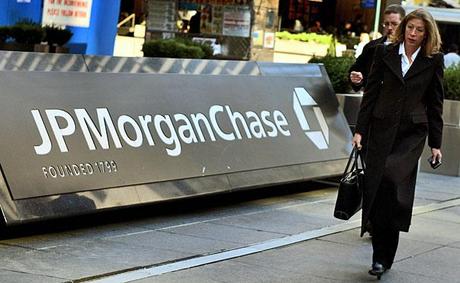 Banking giant JPMorgan Chase has landed in the national spotlight for its abusive debt-collection practices. But this story is not new for Legal Schnauzer readers.
Banking giant JPMorgan Chase has landed in the national spotlight for its abusive debt-collection practices. But this story is not new for Legal Schnauzer readers.I've been reporting for almost a year about Chase's involvement in the personal debt-collection nightmare my wife and I have experienced. I've presented tape-recorded evidence and transcripts of telephone calls that show Chase and its affiliates repeatedly violated federal law in an effort to collect a credit-card debt they could not prove I even owed. We've reported on allegations in a federal lawsuit that Chase played a prominent role in cheating my wife out of her job at a Birmingham-based insurance company. We soon will be presenting evidence that Chase and affiliated lawyers have attempted to corrupt the federal-court system in the Northern District of Alabama.
Now, it appears Mrs. Schnauzer and I are not the only ones fighting back against Chase and its rogue debt-collection network. The attorney general of California last week filed a lawsuit, claiming Chase resorted to unlawful tactics in an effort to collect alleged debts from some 100,000 credit-card holders in the state. Meanwhile, the U.S. Office of the Comptroller of the Currency, one of the bank's chief regulators, is preparing an enforcement action against Chase over the way it collects credit-card debt, according to a new report at The New York Times.
You can be certain the Schnauzer household will make sure that officials in California and D.C.--and anywhere in between--have access to evidence we have accumulated against Chase. It is, as our regular readers know, voluminous and irrefutable.
In California, Chase faces charges that it engaged in illegal tactics such as "robo-signing" and "sewer service litigation" to flood state courthouses with lawsuits that are not supported by facts. AG Kamala Harris takes a dim view of the practice, according to a report in The Los Angeles Times:
Chase's use of illegal robo-signing was “widespread,” Harris' office alleges. The practice involved automatic signing of various documents--some sworn--without reviewing the paperwork or bank records.
"Sewer service" litigation against borrowers was also used by Chase, the suit alleges. The bank failed to even notify credit card holders it was taking them to court, while Chase claimed they had been notified as required by law, Harris' office claims.
What effect does this have on California courts?
Chase, the lawsuit claims, effectively used California's judicial system like a "mill" to obtain default judgments and garnish borrowers' wages. The bank filed thousands of lawsuits every month from January 2008 until April 2011, the state claims. On one day alone, Chase lodged 469 such suits.
Chase also sought default judgments against borrowers who were military members on active duty, the suit claims.
“At nearly every stage of the collection process, defendants cut corners in the name of speed, cost savings and their own convenience, providing only the thinnest veneer of legitimacy to their lawsuits,” the complaint says.
In many cases, Chase uses lies, threats, and other violations of the Fair Debt Collection Practices Act (FDCPA) to scare consumers into paying money they might not even owe. These tactics are employed long before a case reaches the courtroom phase, and my wife and I have experienced them firsthand.
Several layers of bureaucracy often clog a path that flows from Chase to a consumer. In our case, collectors from the Birmingham law firm of Ingram & Associates communicated directly with us. Evidence in our FDCPA lawsuit showed that Pennsylvania-based NCO placed the alleged debt, from an American Express card, with Ingram & Associates. And JPMorgan Chase, via an investment arm called One Equity Partners, owns NCO. Evidence in our case also showed that Ingram & Associates had no documents to show I even possessed an American Express card, much less that I owed a debt on one.
Under the law, Chase had an "agency relationship" with NCO and Ingram & Associates--and that means Chase had "vicarious liability" for the wrongdoing committed against us. What form did the wrongdoing take? We presented a series of videos, including audio that was recorded from conversations with collectors, that lays it out:
* Debt collector for JPMorgan Chase unlawfully communicates with third party to an alleged debt
* Debt collector for JPMorgan Chase unlawfully makes false statements to consumer
* Debt collector for JPMorgan Chase unlawfully directs abusive language to alleged debtor
* Debt collector for JPMorgan Chase unlawfully uses misleading and deceptive language with consumer
We also have presented transcripts that illustrate the misconduct in black and white. The California attorney general is focusing on debt-collection abuses that are designed to cheat consumers in courtrooms. But many consumers cave in to unlawful threats and harassment long before their cases ever reach a courtroom. In fact, evidence strongly suggests that Chase and other collectors engage in such strong-arm tactics because they know they don't have documents to prove a case in court.
The following transcripts lay out such such tactics in stark detail. We will be sharing this information with various state and federal authorities:
Ingram NCO Transcript1 by Roger Shuler
Ingram NCO Transcript2 by Roger Shuler
Ingram NCO Transcript3 by Roger Shuler
